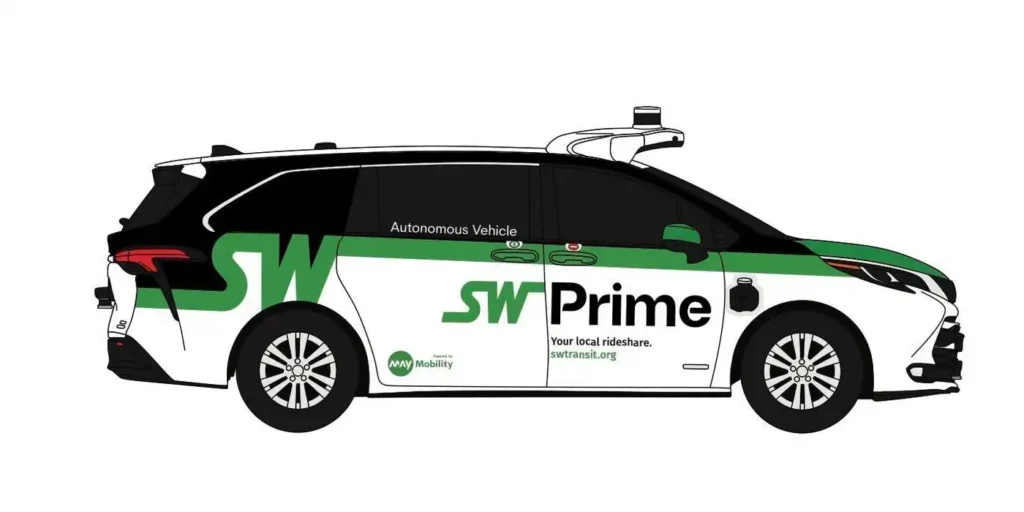O2X Intel and May Mobility Together to Pave the way for a New Era of Autonomous Vehicles.
O2X Intel / July 25, 2024 / 02:47 PM EST
O2X Intel is fully backing client May Mobility for a successful outcome. Our contributions to the Multi-Policy Decision Making (MPDM) system have revolutionized autonomous vehicle technology, enabling them to handle unique challenges. With our unwavering support for May Mobility under the exceptional leadership of Shilpa Tumkur Gopalakrishna, May Mobility offers Southwest Transit will become the first in the metro to ride in autonomous vehicles.
Southwest Transit will introduce self-driving vehicles to its micro-transit service this fall. The autonomous vehicles, provided by May Mobility, will be used as part of the agency’s on-demand services in the metro area. The vehicles will be staffed by an onboard safety operator to assist riders and ensure safety during the initial phase of implementation. This innovative move aims to meet the evolving needs of communities in the southwest metro and stay ahead of transportation trends.

Beginning this fall, the Eden Prairie-based transit agency is introducing vehicles that humans won’t drive. These autonomous vehicles (AVs) aren’t big buses, but rather new minivans the agency will use as part of its on-demand services. SouthWest Transit CEO Erik Hansen says people are curious, and a little nervous, about getting to where they need to go in a self-driving vehicle. “One of the big questions that people ask is, you know after that kind of blows their mind that we might be doing it in the first place is … ‘Well, geez, you know, is that is that going to be okay, is it going to be safe?’” Hansen said. SouthWest Transit isn’t the first in the state to offer self-driving vehicles. Grand Rapids has been doing it since 2019. Hansen has ridden in the self-driving vehicles there and says it’s no big deal. “After a while, it just feels like any other rideshare service,” said Hansen. SouthWest Transit is partnering with a private company — May Mobility — on the three-year, $4.7 million effort. May Mobility helped create goMARTI, also known as Minnesota’s Autonomous Rural Transit Initiative, in Grand Rapids. That service offers free rides six days a week. People schedule the rides using a phone app.
May Mobility says its autonomous vehicles in Grand Rapids have provided more than 8,000 rides and driven over 175,000 miles. When the SouthWest Transit autonomous minivans take to the road this fall, they will perform driving tasks in all or most situations — staffed by an onboard safety operator to assist riders and who can take manual control of the vehicle if necessary. Hansen adds that the new technology will not reduce transit jobs. “No drivers will lose their jobs as they will just move to other routes,” said Hansen. “It will be a net increase in jobs as May Mobility will hire additional staff and operators to run the service.” Daisy Wall, senior director of government business for May Mobility, says the service relies on mapping roads in all kinds of weather conditions. She says the company has learned to be flexible when it comes to putting autonomous vehicles on the road in snowy, icy conditions. “We may say today, we’re just going to operate manually today because we don’t think it’s a good idea to operate autonomously,” Wall said. To date, May Mobility has put driverless vehicles on the road in Detroit, Mich., and elsewhere. When SouthWest Transit’s project comes online, it will be the first to operate driverless vehicles in the Twin Cities metro. Hansen says autonomous vehicles are an innovative way to meet the needs of communities in the southwest metro, communities that are aging and becoming more diverse. “It’s essential for us as an agency to stay ahead of those trends,” Hansen said.
More About May Mobility Service in Detroit, Michigan
In partnership with the City of Detroit, May Mobility’s Detroit-area service, Accessibili-D, is available to eligible and approved participants of the Detroit ADS shuttle service program. This innovative new service is a part of Detroit’s public transit and operates on demand. Accessibili-D is pre-programmed to pick up and drop off riders at specific locations that have been vetted and deemed safe for everyone. Accessibili-D’s vehicle capacity is 4 occupants for a standard vehicle and 3 occupants (1 wheelchair occupant and 2 additional occupants) for wheelchair-accessible vehicles.
Upcoming May Mobility Plans for 2024
- May Mobility Autonomous Vehicles Can Herald a New Era for Detroit Airports.
- Starting Fall, the Peachtree Corners Announces Launch of Autonomous Vehicle Deployment in Partnership with May Mobility and T-Mobile.
